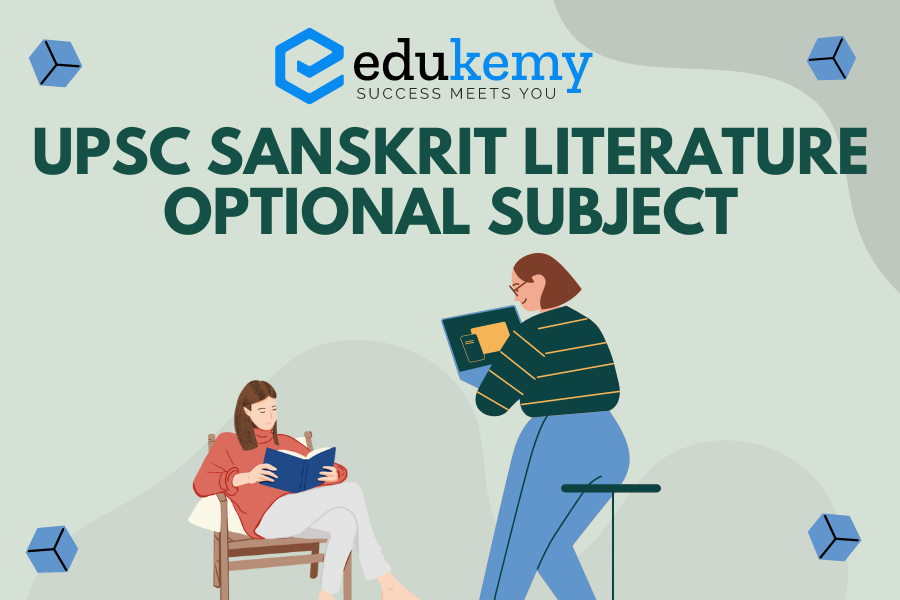
The UPSC Civil Services Examination offers Sanskrit Literature as an optional subject for the Mains exam. This selection delves into the rich tapestry of India’s intellectual heritage, encompassing grammar, philosophy, cultural touchstones, and literary masterpieces. By opting for Sanskrit Literature, candidates embark on a journey to understand the foundations of Indian civilization and its profound impact on the subcontinent’s languages and traditions.
Contents
- 1 Sanskrit Paper 1
- 2 Sanskrit Paper 2
- 3 FAQs on Sanskrit Literature Optional Subject – UPSC
- 3.1 1. Is Sanskrit Literature a good choice for the UPSC Mains exam?
- 3.2 2. What are the benefits of choosing Sanskrit Literature?
- 3.3 3. What are the challenges of taking Sanskrit Literature?
- 3.4 4. What resources can help me prepare for Sanskrit Literature?
- 3.5 5. How can I assess if Sanskrit Literature is right for me?
- 4 In case you still have your doubts, contact us on 9811333901.
Sanskrit Paper 1
Section – A
- Significant features of the grammar, with particular stress on Sanjna, Sandhi, Karaka, Samasa, Kartari and Karmani vacyas (voice usages) (to be answered in Sanskrit).
- (a) Main characteristics of Vedic Sanskrit language
(b) Prominent feature of classical Sanskrit language
(c) Contribution of Sanskrit to linguistic studies - General Knowledge of :—
(a) Literary history of Sanskrit
(b) Principal trends of literary criticism
(c) Ramayana
(d) Mahabharata
(e) The origin and development of literary geners of :
Mahakavya
Rupaka (drama)
Katha
Akhyayika
Campu
Khandakavya
Muktaka Kavya.
Section – B
- Essential of Indian Culture with stress on :
(a) Purusãrthas
(b) Samskãras
(c) Varnãsramavyavasthã
(d) Arts and fine arts
(e) Technical Sciences. - Trends of Indian Philosophy
- (a) Mïmansã
- (b) Vedãnta
- (c) Nyaya
- (d) Vaisesika
- (e) Sãnkhya
- (f) Yoga
- (g) Bauddha
- (h) Jaina
- (i) Carvãka
- Short Essay (in Sanskrit)
- Unseen passage with the questions (to be answered in Sanskrit).

Sanskrit Paper 2
Section – A
General study of the following groups :—
Group 1 (a) Raghuvamsam—Kalidasa
(b) Kumarasambhavam—Kalidasa
(c) Kiratarjuniyam—Bharavi
(d) Sisupalavadham—Magha
(e) Naisadhiyacaritam—Sriharsa
(f) Kadambari—Banabhatta
(g) Dasakumaracaritam—Dandin
(h) Sivarajyodayam—S.B. Varnekar
Group 2 (a) Isãvãsyopanisad
(b) Bhagavadgitã
(c) Sundarakanda of Valmiki’s Ramayana
(d) Arthasastra of Kautilya
Group 3 (a) Svapanavasavadattam—Bhasa
(b) Abhijnanasakuntalam—Kalidasa
(c) Mricchakatikam—Sudraka
(d) Mudraraksasam—Visakhadatta
(e) Uttararamacaritam—Bhavbhuti
(f) Ratnavali—Sriharshavardhana
(g) Venisamharam—Bhattanarayana
Group 4 Short notes in Sanskrit on the following :—
(a) Meghadutam—Kalidasa
(b) Nitisatakam—Bhartrhari
(c) Pancatantra—
(d) Rajatarangini—Kalhana
(e) Harsacaritam—Banabhatta
(f) Amarukasatakam—Amaruka
(g) Gitagovindam—Jayadeva.
Section – B
This section will require first hand reading of the following selected texts :— (Questions from Groups 1 & 2 are to be answered in Sanskrit only) Questions from Groups 3 and 4 are to be answered either in Sanskrit or in the Medium opted by the candidate.
Group 1 (a) Raghuvamsam—CantoI, Verses 1 to 10
(b) Kumarasambhavam—Canto I, Verses1 to 10
(c) Kiratarjuniyaue—Canto I, Verses 1 to 10
Group 2 (a) Isavasyopanisad—Verses—1, 2, 4, 6, 7, 15 and 18
(b) Bhagavatgita II Chapter Verses13 to 25
(c) Sundarakandam of Valmiki Canto15, Verses 15 to 30 (Geeta Press Edition)
Group 3 (a) Meghadutam—Verses 1 to 10
(b) Nitisatakam—Verses 1 to 10 (Edited by D.D. Kosambi Bharatiya Vidya Bhavan Publication)
(c) Kadambari—Sukanasopadesa (only)
Group 4 (a) Svapnavasavadattam Act VI
(b) Abhijnansakuntalam Act IV Verses 15 to 30 (M.R. Kale Edition)
(c) Uttararamacaritam Act I Verses 31 to 47 (M.R. Kale Edition).
FAQs on Sanskrit Literature Optional Subject – UPSC
1. Is Sanskrit Literature a good choice for the UPSC Mains exam?
Answer: It can be a great choice if you already have a strong foundation in Sanskrit and a genuine interest in the language’s literary heritage. Sanskrit Literature offers a vast and rich intellectual tradition, but keep in mind it requires significant dedication and effort.
2. What are the benefits of choosing Sanskrit Literature?
Answer:
- Unique Subject: Sanskrit Literature stands out from common choices, potentially giving you an edge if you excel in it.
- Rich Content: Exposure to ancient Indian philosophy, ethics, and social structures.
- Analytical Skills: Develops critical thinking and analytical skills through close reading and interpretation of texts.
3. What are the challenges of taking Sanskrit Literature?
Answer:
- Difficulty Level: Sanskrit itself can be a challenging language to learn, especially if you have no prior knowledge.
- Vast Syllabus: The syllabus covers a wide range of texts, from Vedas to epics and dramas, requiring in-depth understanding.
- Limited Resources: Compared to some other optional subjects, finding study materials and coaching specifically for Sanskrit Literature might be harder.
4. What resources can help me prepare for Sanskrit Literature?
Answer:
- NCERT textbooks on Sanskrit
- Standard reference books by scholars like A.A. Macdonell, V.S. Apte, etc.
- Previous years’ UPSC question papers for practice
- Consider coaching institutes specializing in Sanskrit Literature (if available)
5. How can I assess if Sanskrit Literature is right for me?
Answer:
- Evaluate your interest: Do you find ancient Indian literature and philosophy fascinating?
- Language proficiency: Are you comfortable learning a new language, or do you already have a basic understanding of Sanskrit?
- Dedication required: Be prepared to invest significant time and effort in studying vast amounts of text.
In case you still have your doubts, contact us on 9811333901.
For UPSC Prelims Resources, Click here
For Daily Updates and Study Material:
Join our Telegram Channel – Edukemy for IAS
- 1. Learn through Videos – here
- 2. Be Exam Ready by Practicing Daily MCQs – here
- 3. Daily Newsletter – Get all your Current Affairs Covered – here
- 4. Mains Answer Writing Practice – here

